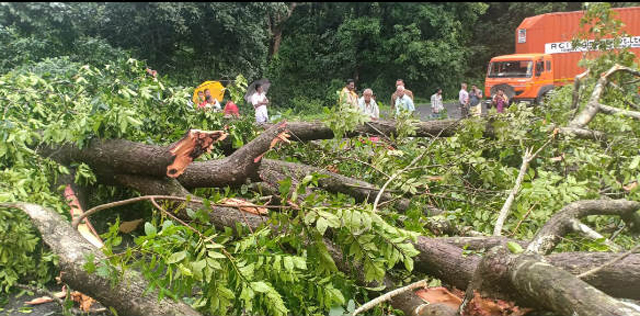
Mangaluru, Aug 5: Normal life was thrown out of gear as heavy rain and gusty winds lashed large parts of coastal and malnad districts of Karnataka in last 48 hours. Widespread power outages due to tree fall and minor landslides were reported in last 24 hours.
Meanwhile, Indian Meteorological Department has sounded a red alert for Uttara Kannada, Udupi and Dakshina Kannada districts 8:30am of August 5.
In Mangaluru city there were several tree falls disrupting power supply in key areas of the city. Four electricity poles were damaged after a tree fell on Boloor Jarandaya road due to rain and heavy winds. In Neermarga too, there were a couple of tree falls in the morning cutting off power supply, which was not restored till this report was sent.
Mescom bore the brunt of the rains in Udupi and Dakshina Kannada District and at the last count as many as 148 electric poles, 23 transformers and 65 kilometer conductor wires were damaged due to poles being damaged in tree fall and landslides.
Traffic was affected on Charmadi Ghat on the Mangaluru-Chikkamagaluru route due to a tree fall on the second hair pin bend.
On Monday, landslides near Kottigehara, Chikkamagaluru District, left traffic badly affected. Though normalcy has been restored on the route after blocking the road for restoration till Tuesday morning, locals fear more landslides due to continuous downpour.
Kodagu district too received heavy rainfall in past 24 hours which resulted in water logging in low-lying areas.
In the Coast, Uttara Kannada received the highest amount of rainfall at 91mm, followed by Udupi at 75 and DK at 73mm. The highest Rainfall of 241 mm was recorded at Castlerock, Supa Taluk in Uttara Kannada District.
KSNMDC bulletin stated that widespread moderate to heavy rains associated with strong surface winds at times and isolated very heavy to extreme heavy rains was likely over Udupi, Dakshina Kannada and Uttara Kannada districts It also stated that wind speeds ranging between 50kmph to 60 kmph was forecast along the coast of Karnataka from Mangaluru to Karwar, warning fishermen not to venture into the sea.





Comments
what you know about HAJJ, first you try to learn your religion man you maron...you know in veda says there is no image of GOD, dont follow donkey, follow hindu scripture, first of all dont know what is hindu religion and goes to show finger on MUSLIM, look at you face in mirron and ask yourself do you following GODs religion or Devil religion...who is your god bootha or pure GOD.
dont act like maron of hindu community, think before comment, any thing happens to hindu then they blame muslim, what a joke,,there is saying that 80% dogs are worried about 14% lion in forest..haha
yo naresh, first try to learn veda the hindu scripture. which says there is no image of god..if you follow poojari then go to hell, who told muslims are not allowed, did you went any time to masjid to see how it is operated. you maron always behind bar and worship stone, how will your brain develop..first try to become good hindu then you can point muslim.
In most of the masjids having seperate place for woman also... better at least provide seperate way for hindu woman in temples to avoid mingling .... above judgement is on internal issue of hindu custom issue , why dragging muslims to it ?
According to North states' people and BJP people, there is a chance of flood again in Kerala, becuase SC challenged GOD. Those north state fools said that Kerala Flood was aftermath of Sabarimala verdict. Even RBI official backs the statement
Actually 99 percent of women in Kerala following the rule. They are waiting for their turn. Its like hajj. You people wont understand that. Some fools filed petition in order to destroy Hindu religious customs and traditions and muslim lawyer advocated for that. Now everything perished
Silly issue got more hype.
All bloody activists wants to destroy Hindu religion thats it. They won't raise voice against inequalities in Islam. They won't question their customs.
So called activitsts not protesting against inequalities among muslims. Why muslim girls cant enter in to mosque for offering namaz. Why they have seperate one.
Gender equality won
Add new comment